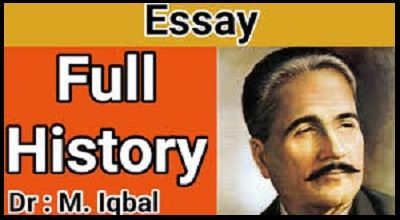Alama Muhammad Iqbal
Alama Muhammad Iqbal, known as the national poet of Pakistan, holds a prominent place in the literary and political landscape of the region. His poetry, philosophy, and vision played a crucial role in inspiring the movement for the creation of Pakistan. This essay delves into his life, works, and the enduring impact of his thoughts on Pakistan and the Muslim world.
Early Life and Education
Birth and Family Background
Alama Muhammad Iqbal was born on November 9, 1877, in Sialkot. Which was then part of British India. His family had a rich cultural background. With influences from both the Muslim and Punjabi traditions. His father, Sheikh Noor Muhammad, was a tailor, and his mother, Imam Bibi, was a homemaker who nurtured Iqbal’s love for poetry and culture from a young age.
Academic Pursuits
Iqbal’s early education took place in Sialkot. Where he showed exceptional talent in languages, particularly Persian and Urdu. He later moved to Lahore for higher studies. Where he obtained a Bachelor’s degree from Government College. Pursuing further education, Iqbal traveled to England, where he enrolled at the University of Cambridge, earning a degree in Philosophy. He also studied law at Lincoln’s Inn. Which enriched his worldview and literary voice.
Iqbal’s Literary Contributions
Poetry as a Medium of Expression
Iqbal’s poetry is characterized by its deep philosophical insights and its passionate call for spiritual revival among Muslims. His use of Persian and Urdu languages allowed him to reach a broad audience, blending classical forms with modern themes.
Major Works
Asrar-e-Khudi (Secrets of the Self)
Published in 1915, this work marked Iqbal’s emergence as a significant literary figure. It emphasizes the importance of self-awareness and individuality, urging readers to recognize their potential and role in society.
Rumuz-i-Bekhudi (The Secrets of Selflessness)
In this philosophical poem, Iqbal discusses the relationship between the individual and the community. He argues that true selflessness leads to a collective consciousness, essential for the upliftment of society.
Shikwa (Complaint) and Jawab-i-Shikwa (Response to the Complaint)
These two poems explore Iqbal’s relationship with God and express the grievances of the Muslim community regarding their decline. Shikwa presents a bold complaint, while Jawab-i-Shikwa offers a profound response, emphasizing hope and resilience.
Themes in Iqbal’s Poetry
Iqbal’s poetry is rich with themes of self-discovery, spiritual awakening, and the revival of Islamic civilization. His emphasis on the concept of Khudi (selfhood) is central to understanding his philosophy.
Iqbal’s Philosophical Views
Concept of Khudi
The notion of Khudi is pivotal in Iqbal’s philosophy. He believed that the realization of one’s self is crucial for personal and communal growth. This idea encourages individuals to transcend their limitations and strive for higher goals.
Spiritual and Social Awakening
Iqbal called for a renaissance among Muslims, advocating for a return to the core values of Islam. He emphasized the need for education, self-discipline, and a collective identity, believing that these elements were vital for the progress of the Muslim community.
Political Engagement
Involvement in Politics
Iqbal’s literary contributions were intertwined with his political activism. He was an advocate for the rights of Muslims in British India, and his vision for a separate homeland for Muslims culminated in the idea of Pakistan.
All-India Muslim League
As a member of the All-India Muslim League, Iqbal played a significant role in articulating the aspirations of Muslims in India. His famous address at the Lahore session in 1930 is considered a pivotal moment in the demand for a separate nation.
Legacy of Alama Iqbal
National Poet of Pakistan
After the creation of Pakistan in 1947, Iqbal was declared the national poet. His vision and ideas continue to inspire generations, symbolizing hope, resilience, and national identity.
Influence on Literature and Philosophy
Iqbal’s poetry has influenced not only Urdu literature. But also philosophical thought across the globe. His works are studied in various academic institutions, and his ideas continue to resonate in contemporary discussions on identity, spirituality, and nationalism.
Iqbal’s Vision for Pakistan
Concept of a Modern Islamic State
Iqbal envisioned Pakistan as a modern Islamic state, where social justice, equality, and democratic principles would thrive. He believed in the synthesis of modernity and tradition, advocating for a society that harmonizes Islamic values with contemporary needs.
Education and Empowerment
Iqbal emphasized the importance of education in building a prosperous nation. He believed that knowledge and enlightenment were the keys to social and political empowerment for Muslims.
Conclusion
Alama Muhammad Iqbal remains a towering figure in the history of Pakistan and the broader Muslim world. His poetry, philosophy, and political vision have left an indelible mark, shaping the identity of a nation. As Pakistan continues to navigate the complexities of modernity and tradition, Iqbal’s thoughts and writings serve as a guiding light for future generations.
FAQs
1. What inspired Alama Iqbal to write poetry?
Iqbal was deeply influenced by his cultural heritage, the socio-political conditions of his time, and his studies in philosophy. His desire for spiritual and social awakening among Muslims motivated him to write.
2. What are some key themes in Iqbal’s poetry?
Key themes include self-discovery (Khudi), spiritual awakening, the revival of Islamic civilization, and social justice. His works often reflect the struggles and aspirations of the Muslim community.
3. How did Iqbal contribute to the creation of Pakistan?
Iqbal’s political activism and vision for a separate homeland for Muslims in India were crucial in articulating the demand for Pakistan. His famous address in 1930 is considered a turning point in this movement.
4. Why is Iqbal regarded as the national poet of Pakistan?
Iqbal is celebrated for his significant contributions to Urdu and Persian literature, his philosophical insights, and his role in inspiring the movement for Pakistan, which resonates deeply with the national identity.
5. How is Iqbal’s legacy remembered today?
Iqbal’s legacy lives on through his poetry, philosophy, and the ongoing relevance of his ideas in contemporary discussions on identity, spirituality, and national values in Pakistan and beyond.
